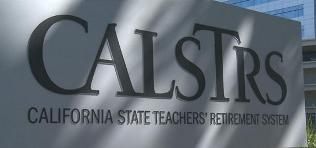Upbeat S&P report on CA also has CalSTRS warning
 The recent Standard & Poor’s report upgrading California’s credit rating prompted headlines not just in the Golden State but in Washington and on Wall Street, where it was depicted as part of Gov. Jerry Brown’s narrative of the state’s continuing rebound. Here are excerpts of the Sacramento Bee’s coverage:
The recent Standard & Poor’s report upgrading California’s credit rating prompted headlines not just in the Golden State but in Washington and on Wall Street, where it was depicted as part of Gov. Jerry Brown’s narrative of the state’s continuing rebound. Here are excerpts of the Sacramento Bee’s coverage:
Standard & Poor’s attributed California’s improving budget outlook more to reduced discretionary spending than to tax increases passed in 2012. The fourth-term governor, a relatively moderate Democrat, is under pressure from social service advocates and some lawmakers of his own party to restore services cut during the recession.
This is a crucial point. Many Democratic lawmakers cite Proposition 30’s temporary sales- and income-tax increases as putting the state on the path toward fiscal stability. But to outsiders crunching the numbers, what’s been even more important is Brown’s refusal to go along with the old theory of “baseline budgeting,” which holds that state agency spending must go up by at least the amount of inflation every year, no matter what.
The Bee, unlike most papers, also noted an S&P warning:
“For California, a future revenue slump isn’t only possible, it’s expected,” the credit rating agency Standard & Poor’s said in a report.
An over-optimistic assessment of the state’s future revenue growth, the report said, would be “the most significant identifiable threat to the state’s ongoing fiscal recovery.”
S&P wary of pension bailout costs
But what got no coverage that I saw was S&P’s warning about the immense headaches that state leaders will face as the CalSTRS bailout costs kick in. Here’s the short version: “the state teachers’ retirement system (CalSTRS) is in need of a long-term funding strategy. ”
The bailout mandates that total annual contributions to CalSTRS go from $5.9 billion in 2014 to at least $10.9 billion in fiscal 2020-21. Of the additional $5 billion, 70 percent is to come from school districts, 20 percent from the state general fund and 10 percent from teachers. But since school districts get nearly all their money from the state, the deal actually is likely to require that the state come up with an extra $4.5 billion a year in fiscal 2020-21. The prospect that school districts will be forced to cut elsewhere to pay for the bailout is unlikely.
This is from a May 2014 Cal Watchdog look at the daunting long-term budget numbers:
[We will see] perpetual junkyard-dog budget fights in which the CTA and CFT — determined to grab every last dollar to maintain the status quo of teacher pay raises — fight constantly over funding with every competing lobby or interest group.
Why? Because the bailout is going to cost so much, and in the zero-sum game of state budgeting, the question is whether the cost is absorbed in the larger K-12 state budget — or out of the hides of other state programs. …
The CTA and the CFT didn’t achieve their dominance of Sacramento by playing nice. Covering the cost of the CalSTRS bailout going forward is going to be the Sacramento version of the federal budget sequester for non-education budget categories. Spending on just about everything but K-12 is going to be curtailed.
It the next year or two, as this sinks in, the push to make the Proposition 30 sales- and income-tax hikes permanent is likely to go from background noise to the biggest issue in Sacramento.
Chris Reed
Chris Reed is a regular contributor to Cal Watchdog. Reed is an editorial writer for U-T San Diego. Before joining the U-T in July 2005, he was the opinion-page columns editor and wrote the featured weekly Unspin column for The Orange County Register. Reed was on the national board of the Association of Opinion Page Editors from 2003-2005. From 2000 to 2005, Reed made more than 100 appearances as a featured news analyst on Los Angeles-area National Public Radio affiliate KPCC-FM. From 1990 to 1998, Reed was an editor, metro columnist and film critic at the Inland Valley Daily Bulletin in Ontario. Reed has a political science degree from the University of Hawaii (Hilo campus), where he edited the student newspaper, the Vulcan News, his senior year. He is on Twitter: @chrisreed99.
Related Articles
Will unions now thank Wall Street?
Steven Greenhut: Last week, I was a witness on a mock trial at Freedom Fest, in which public employee unions
CalWatchdog Morning Read – August 11
Controversial language dropped from Title IX bill L.A. has deadliest air in the country Audit of Brown’s twin tunnels project
Lawmaker: Expel students who engage in worst ‘sexting’
At a time when the U.S. legal system is facing critics from both the Left and the Right for overprosecuting




